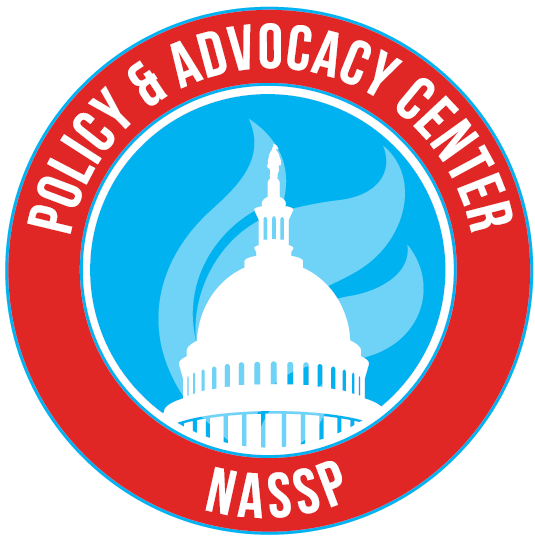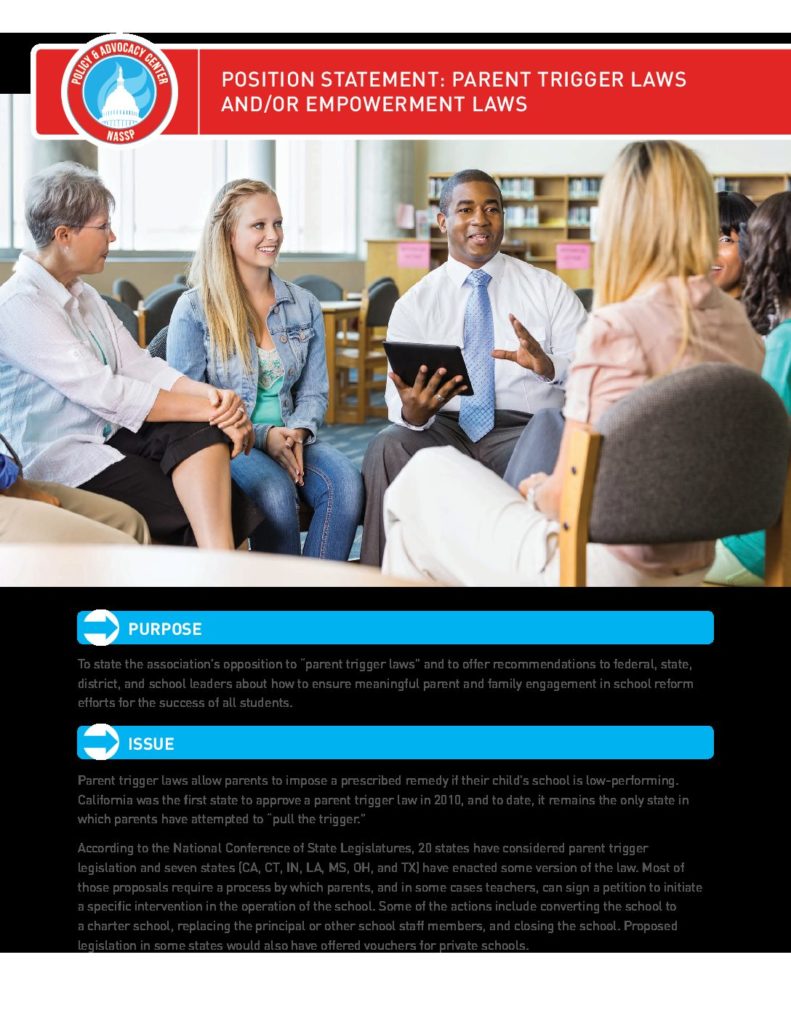To state the association’s opposition to “parent trigger laws” and to offer recommendations to federal, state, district, and school leaders about how to ensure meaningful parent and family engagement in school reform efforts for the success of all students.
Parent trigger laws allow parents to impose a prescribed remedy if their child’s school is low-performing. California was the first state to approve a parent trigger law in 2010, and to date, it remains the only state in which parents have attempted to “pull the trigger.”
According to the National Conference of State Legislatures, 20 states have considered parent trigger legislation and seven states (CA, CT, IN, LA, MS, OH, and TX) have enacted some version of the law. Most of those proposals require a process by which parents, and in some cases teachers, can sign a petition to initiate a specific intervention in the operation of the school. Some of the actions include converting the school to a charter school, replacing the principal or other school staff members, and closing the school. Proposed legislation in some states would also have offered vouchers for private schools.

Proponents of parent trigger laws contend that parents are best positioned to advocate for their children’s education and will make informed choices about the school options that are presented to them. Research demonstrates, however, that “parents are often not provided with the information necessary to most effectively choose among various educational options, and parents with less wealth and less formal education are the least likely to have this information.” Nonetheless, parent and family engagement in schools is an important component of comprehensive school improvement efforts. The National PTA estimates that meaningful family engagement can raise student academic achievement so substantially that schools would need to increase spending by more than $1,000 per pupil to gain the same results.
Guiding Principles
Breaking Ranks provides school leaders with a framework for improving schools through collaborative leadership and professional learning communities; creating relevance through personalizing the school environment; and addressing issues of rigor through curriculum, instruction, and assessment. A key recommendation in Breaking Ranks calls for schools and students’ families to be partners in fostering the academic, intellectual, social, and emotional success of each student.
NASSP believes that before a principal at a school is replaced, the school district must conduct a comprehensive evaluation of the principal’s performance that includes his or her ability to build strong community relationships with stakeholders within and outside the schools.
The NASSP Board of Directors approved a position statement in 2000 stating its opposition to private school vouchers and any proposal that would divert funding away from public schools.
Recommendations
Federal policymakers
- Federal policymakers should create incentives for states, districts, and schools to meaningfully engage families in their children’s education using research-based strategies and practices.
- Federal policymakers should support the establishment of Local Family Engagement Centers that would provide training, services, and supports to engage families in their children’s education and would help build the school-family partnerships necessary to ensure that all children are on track to graduate from high school ready for college and careers.
- Federal policymakers should maintain funding for Parental Information and Resource Centers to focus on high-quality capacity-building, training, and technical assistance for states, school districts, and schools to scale up family engagement strategies.
States
- States should not enact parent trigger laws and should instead focus resources on school improvement strategies that are built around using data to inform instruction, developing teacher and leader effectiveness through high-quality professional development and evaluation, reforming instructional strategies, and expanding learning time.
- States should establish a statewide family engagement coordinating council and develop statewide family engagement in education plans.
- States should develop standards and curricula for family engagement in education for teacher and principal preparation programs and should ensure that teachers, principals, and other school leaders receive professional development on improving family engagement in education.
School districts
- School districts should engage families and communities in school improvement activities.
- School districts should partner with community-based organizations to identify community resources, services, and supports to remove economic obstacles to family engagement in education by meeting families’ needs.
School leaders
- School leaders should maintain an open-door policy that encourages parents and community members to visit and volunteer at the school.
- School leaders should implement organizational practices and school schedules that allow for parent and community involvement.
- School leaders should create a broad-based site council—composed of administrators, teachers, support staff members, parents, community members, and students when appropriate—that is responsible for overseeing school improvement efforts.
- School leaders should communicate regularly with students’ families about their progress through calls and written or digital communication.
- School leaders should include parents in the development and review of their child’s personal plan for progress using student-led conferences held in the school.
- School leaders should create platforms on which parents can meet both in person and online to encourage communication with and among parents.
Resources
- Annenberg Institute for School Reform at Brown University, Center for Education Organizing. (2012). Parent trigger: no silver bullet. Retrieved from https://files.eric.ed.gov/fulltext/ED553695.pdf.
- National Association of Elementary School Principals& National Association of Secondary School Principals. (2012). Rethinking principal evaluation: A new paradigm informed by research and practice. Retrieved from www.nassp.org
- National Conference of State Legislatures. (n.d.). Parent trigger laws in the states. Retrieved from http://www.ncsl.org/issues-research/educ/state-parent-trigger-laws.aspx.
- Lubienski, C., Scott, J. T., Rogers, J., &Welner, K. G. (2012). Missing the target? The parent trigger as a strategy for parental engagement and school reform. Retrieved from the National Education Policy Center website: http://nepc.colorado.edu/files/pm-trigger-2012.pdf.
- National PTA. (2009).PTA national standards for family-school partnerships: an implementation guide. Retrieved from http://www.pta.org/files/National_Standards_Implementation_Guide_2009.pdf.
- National PTA. (2012).National PTA 2012 public policy agenda. Retrieved from https://s3.amazonaws.com/rdcms-pta/files/production/public/2012%20Public%20Policy%20Agenda_REVISED_v9.pdf.

